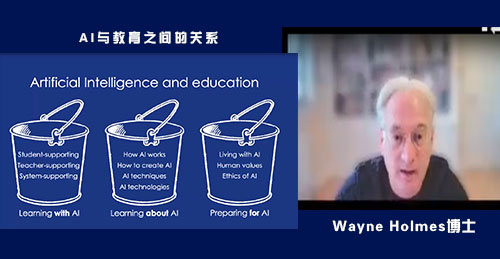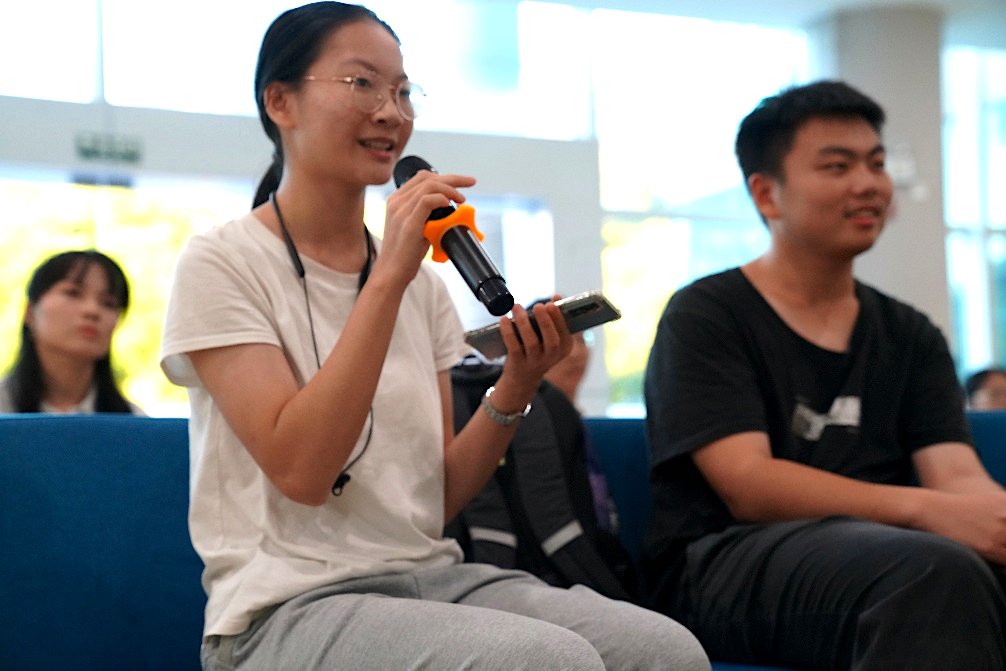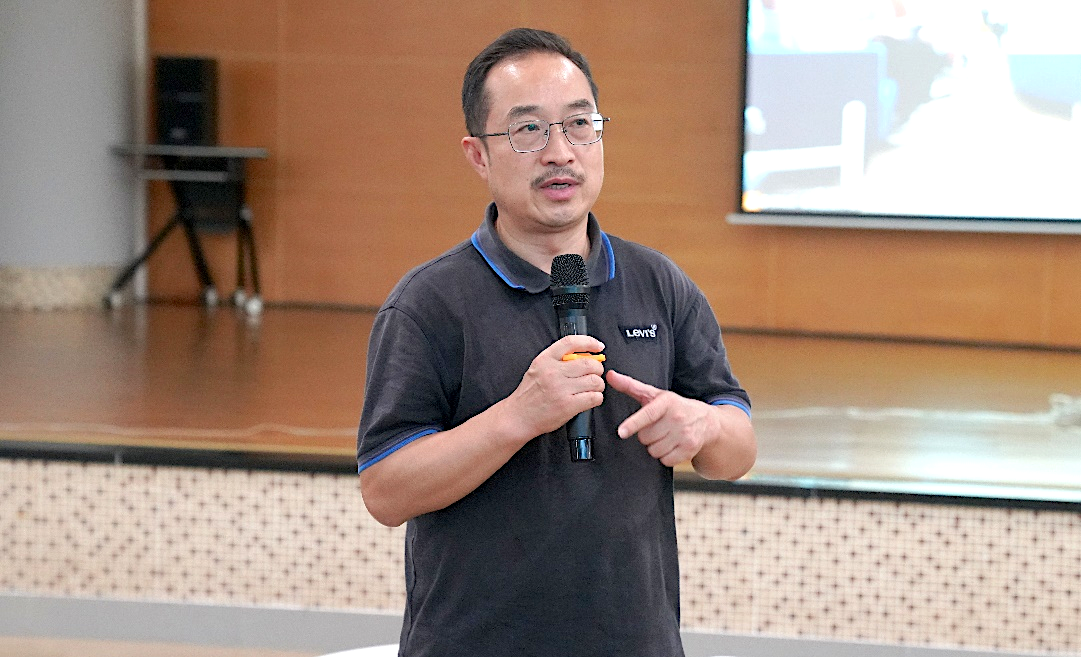On the afternoon of June 23rd, the 10th Future Education International Salon series lecture "Artificial Intelligence and Future Education," hosted by the Future Education Institute, was held in Salon Area A101 of the Li Jia Building at Beijing Normal University Zhuhai Campus.
The keynote speaker invited to this salon was Dr. Wayne Holmes, who teaches at the Institute of Education at University College London. Wayne mainly focuses on research in learning science and educational technology innovation and holds positions such as Director of the UNESCO International Artificial Intelligence Research Center and European Commission Researcher. In this salon, Wayne gave a wonderful lecture entitled "Artificial Intelligence and Education" and explored the complex relationship between artificial intelligence (AI) and education from a critical research perspective. Professor Sun Bo, Vice Dean of the Future Education Institute, Professor Yuan Li, and related faculty and students from the Institute, as well as online listeners, participated in this event.

Wayne first analyzed the current application of AI technology in education from three aspects: learning with AI, learning about AI, and preparing for AI. He affirmed the progress brought by the widespread use of AI technology by teachers and students in the field of education. At the same time, Wayne also pointed out the limitations of AI technology and the challenges it brings to education. For example, the negative effects of AI application on personalized learning, collaborative learning, cognitive development, student autonomy, and teacher leadership, as well as ethical issues in classroom learning and exam monitoring. In addition, the developers of current AI education products often solve surface problems from a technical perspective rather than solving fundamental educational problems from an educational perspective. Moreover, the effectiveness of commercial AI products has yet to be confirmed by independent evaluations. Finally, Wayne summarized that facing the enormous potential of AI, we should avoid simple "automated teaching" applications and use AI to develop innovative teaching and learning models to solve practical problems in education, meet practical educational needs, and promote inclusivity and fairness in education.
In the following Q&A session, Dr. Wayne Holmes interacted with faculty and students from the Future Education Institute. Liu Xiantao, a senior student majoring in history education, asked how AI technology, which is essentially a "cold" program, can better integrate into human society and generate "warmth." Wayne agreed with the student's opinion and said that AI technology itself does not produce positive effects, and the key is how engineers or educational workers choose to use it. AI technology cannot replace the core position of teachers in education, and using AI technology to assist teachers' growth may be better than using it directly for teaching.
Cai Qintong, a senior student majoring in English education, had a wonderful Q&A session with Wayne. Cai Qintong asked, "Based on the strong ability of AI technology in data analysis and pattern recognition, can AI technology be used to analyze students' behavior data and discover some potential patterns that teachers cannot find?" Wayne replied, "I agree with your opinion. Data can tell us a lot of useful information, but we need to pay attention that our way of obtaining data is limited to interactions between students and electronic systems or monitoring records through cameras. In actual teaching, many activities that students participate in are non-electronized. Therefore, data is useful, but this is only a small part. We cannot use this data to understand how students learn, but we can use this data to understand how students learn in specific situations. I think it is meaningful for researchers to use these monitoring technologies for scientific research in an ethical manner, but it would be very bad if these technologies were applied to all classrooms. Cai Qintong followed up by asking whether AI can use data related to exam scores, as students in China need to take many exams. Wayne replied that for most tests, AI analysis is not necessary, and some standardized systems can complete relevant calculations and statistics. For him, it is meaningful for researchers to use AI, such as multimodal learning analysis, to study students' learning and communicate their findings to teachers, but it may not be suitable to use these technologies in routine teaching.
Zhang Nuoya, a student from the School of Foreign Languages and Literature, asked about the issue of low accuracy in AI facial recognition of black women mentioned in the speech. She speculated that AI technology is mostly developed by developed countries such as the United States and Europe, so they may use more white sample data in the testing phase. She asked, "Assuming that such AI technology is promoted worldwide, will it cause racial or gender discrimination, or even educational inequality? How should we deal with these issues?" Wayne responded that the use of technology does lead to some discrimination issues. For example, when applying for a UK passport, Chinese people are judged to be non-open-eyed due to differences in eye shape with Europeans and cannot be verified by the system. Regarding gender discrimination issues, current AI engineers

Professor Yuan Li from the Future Education Institute and Wayne further explored the issue of personalized learning: we should strive to help students achieve different goals, rather than just providing different learning paths for students to reach the same goal. Wayne believes that personalized learning is like a journey, and its significance lies in being able to go wherever you want. However, the problem with existing AI-assisted teaching systems is that they can only take students to the same destination, which is not truly personalized. AI can be used as a bridge between students and teachers to facilitate personalized conversations and help students choose personalized tutoring based on their own needs, rather than having AI judge students' needs. Wayne also pointed out that when we are discussing personalized learning, we are actually adopting an "American-style" approach and value orientation, believing that the goal of personalized learning is individual success, but it ignores the power of social learning valued by Asian culture, where common communication, discussion, and collaboration are equally important for learning.

Finally, Professor Sun Bo, Vice Dean of the Future Education Institute, stated that this salon was held to help students understand the application of artificial intelligence in the field of education, improve the cognitive level of normal students on intelligent education, and prepare for their future teaching career. He hoped that students could broaden their horizons and expand their perspectives and methods of thinking through more exchanges like this. This salon activity allowed everyone to have a deeper understanding of the pros and cons of artificial intelligence, and how to better leverage its strengths and avoid weaknesses in education. The salon ended successfully in a warm atmosphere.



 Last Page
Last Page

 Phone:0756-3621121
Phone:0756-3621121
 Email:ccie@bnu.edu.cn
Email:ccie@bnu.edu.cn